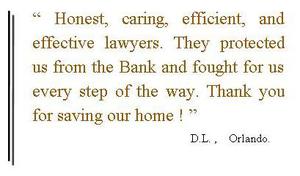
CHAPTER 7 BANKRUPTCY
What is Chapter 7 Bankruptcy?
Chapter 7 Bankruptcy generally discharges all of your unsecured debt. Most common forms of unsecured debt are credit cards and medical bills. Some debts such as old IRS delinquent taxes under certain circumstances can also be discharged. Some unsecured debts such as child support and student loans cannot be removed. Once you file a bankruptcy case, all creditors must immeidately cease any communication with you until the bankruptcy court orders otherwise. This is often referred to as the "automatic stay". During the automatic stay, if creditors contact you, they will be in violation of the law, and may be penalized in some situations. Each person can file a new bankruptcy case every 8 years. The good thing about a Chapter 7 bankruptcy case is that it wipes off most of your unsecured debt, and there may be some situations where your secured debt, such as a wholly unsecured second mortgage can also be wiped off. Based on reports from many of our Firm's clients, lenders are offering new credit to them within two years of their banktupcty case.
Should You File a Chapter 7 Case?
When you are faced with mounting debt and you feel that there is no way out, you may want to consider filing bankruptcy as an option. With people losing homes to foreclosures in record numbers, unemployment or under employment, mounting debt, and banks more willing to pursue borrowers on deficiencies, one serious option is filing a Chapter 7 Bankruptcy. By doing so, in many instances you can wipe out your personal debt and keep creditors away. Over the years, we have helped many people file for, and successfully discharge their debt in Chapter 7 bankruptcy. If you are considering filing for Chapter 7 Bankruptcy as an option, it is important to contact Ben Zaeri to discuss your options, alternatives and solutions. Your initial consultation is always free of charge.
Eligibility Requirements.
In order to qualify for Chapter 7 Bankruptcy, you must first pass a "Means Test". The Federal Government each year determines the median income of the population in each State on an annual basis, and requires that an individual filing a Chapter 7 case show income below the median income amount. for 2015, the Florida median income has been $42,036 for one person, $51,584 for a family of 2; $57,052 for a family of 3; and $66.461 for a family of 4. If your gross income is above these limits, do not despair. You can have a much higher income and may still qualify for a Chapter 7 filing, when certain deductions are taken from your bottom line. In order to find out if you qualify, you are encouraged to call us and we will be glad to give you a firm answer based on your particular income and expenses.
Is my Home Protected? (Homestead Protection)?
Under the Florida Constitution your personal home enjoys protection from creditors. This is referred to as homestead protection, which means that creditors cannot place a lien, or force you out of your home unless they hold a mortgage on it. If your mortgage lender takes your home in a foreclosure action, filing bankruptcy will help avoid any deficiency. This means if the lender takes and sells the home in foreclosure for an amount less than is owed, if you file bankruptcy, you will avoid personal liability and lawsuit by that lender.
What you need to know when considering filing for bankruptcy.
Our government has bankruptcy laws to protect not only the creditors, but you! If you have an unmanageable debt-load, it may be time to face financial facts. With the right information, filing bankruptcy could give you the financial footing you need to get a fresh start.
Bankruptcy can be used to STOP creditor harassment, bank account garnishment, lawsuits, foreclosure, auto repossession, wage garnishments and tax levies. Review our answers to commonly asked bankruptcy questions or use our "FREE Consultation" form and we will respond to you promptly. You can always call the Law Office of Zaeri & Associates to speak directly with an attorney.
Bankruptcy Means Test: Determining if you qualify for a Chapter 7
The Means Test evaluates whether your current monthly income (from all sources) is greater or less than the applicable median income. Current Monthly Income (CMI) is defined as the average monthly gross income received during the six full months just prior to your bankruptcy filing. CMI includes gross income from all sources including income of a non-filing spouse, regular gifts or assistance from family members, and gross income from a wholly-owned business. On the other hand, social security income is excluded from the definition of CMI.
Failing the means test means there is a “presumption of abuse” and you cannot file a Chapter 7 bankruptcy, but you may be able to overcome that presumption if special circumstances call for an adjustment to your income or expenses. Some examples of possible “special circumstances” are job loss or pay cut, a serious medical condition, or unusually high child care expenses. To establish that your financial situation is a special circumstance that warrants a waiver of the means test formula, you will have to show that your expenses incurred are reasonable and that you have no reasonable alternative. Judges are given discretion to determine if special circumstances allow filing a Chapter 7 bankruptcy by a debtor who cannot pass the means test formula.
When is Chapter 7 Bankruptcy Appropriate?
An individual Chapter 7 bankruptcy case is used for liquidation of debts, but an individual debtor may claim certain property exempt and retain it. In addition to preserving exempt property, the individual debtor seeks a discharge of most debts.
If you own assets that are nonexempt, you may be required to liquidate them. The court would then distribute the proceeds from the sale to your unsecured creditors as partial satisfaction of the debts you owe. Any remaining unpaid debt would then be discharged (with some exceptions), and you would no longer be held responsible for it. You can only file under Chapter 7 if you pass the Means test. Otherwise, you must file under Chapter 13 for relief.
Mandatory Credit Counseling and Debtor Educational Courses:
Under the bankruptcy law, bankruptcy filers are required to complete pre-bankruptcy credit counseling and pre-discharge debtor education from an approved nonprofit credit counseling agency.
There are only three situations where credit counseling is not required:
1. Incapacity, where the person is so impaired by reason of mental illness or deficiency that the individual is incapable of making rational decisions.
2. Disability, where the person is so physically impaired that the individual is unable, after reasonable effort, to participate in an in person telephone or internet briefing session.
- Active military duty in a military combat zone.
You must file a separate motion if you want the court to grant
you this type of exemption. Only credit counseling organizations
and debtor education course providers that have been approved
by the U.S. Trustee program may issue these certificates. Once
completed, a certificate is faxed or e-mailed by the agency to our
office. Most clients complete this course over the phone or on
the Internet.
How Will Bankruptcy Affect My Credit Score?
In most instances, the score improves over a short period of time. Typically our clients report to us that they were able to rebuild their credit within about 2 years of discharge. The reason for this is that creditors know that you have little or no remaining debt after discharge, and that you will not be eligible to file another bankruptcy case for 8 years. So, they see those coming out of a bankruptcy discharge as a “good risk” and are willing to extend new credit. We suggest that you use a reputable credit reporting agency to see your score prior to filing and to monitor your score after filing.
Can Bankruptcy Stop Foreclosure of My Home?
Yes, but it depends. Chapter 7, 11 or 13 will stop a foreclosure as long as there are no prior bankruptcy filings that might restrict another filing against the property. If you have previously filed bankruptcy, ask us. In some rare cases, the filing of a bankruptcy will not stop the foreclosure. Chapter 7 will temporarily stop a foreclosure. Chapter 11 or 13 will stop the foreclosure and allow you to reorganize the mortgage debt, but only if you pay the regular monthly payments plus arrearages going forward from the filing date.
Have questions or would like to make an appointment?
Call us at 407-788-8548 or simply Click Here to send us an email.





